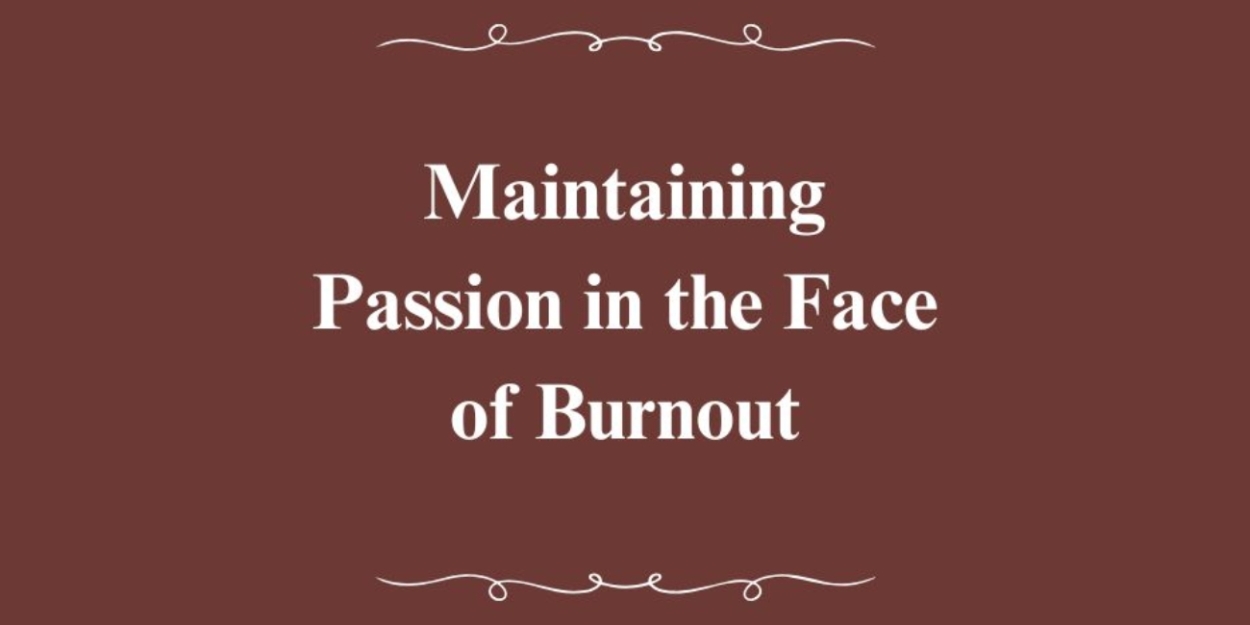Student Blog: Maintaining Passion in the Face of Burnout
Burnout, I have found, is the enemy of passion.

It’s almost a rite of passage for a college student to experience burnout. Whether it’s from the workload of courses or the stress of a part-time job, burnout is a state of exhaustion that can be debilitating.
When I experience burnout, I frequently question my own skills and anything that I’ve ever considered a success. Sometimes, I find myself doubting that I deserve flowers for any of my achievements, instead convincing myself that my successes are undeserved. After all, if I find myself burning out from just a couple of homework assignments, how could I possibly have managed past achievements?
Burnout, I have found, is the enemy of passion. With the exhaustion, doubt, and uninspired state it puts me in, I’ve found it difficult to explore the things I enjoy the most. Whether it’s the effort I put into a performance, crafting choreography, or creative writing, it’s always more difficult for me to take that first step when I’m spent.
I’ve struggled with burnout a lot through the years, and through college I’ve really tried to work my way through it, especially this last year. This last semester was a challenge for me regarding this – I began pursuing a second degree, I assisted in shows at my university, I worked more hours at my job than in previous semesters, and I performed in community shows. So, it was easy for me to slip into burnout.
For me, I find myself experiencing burnout during the aftermath of stressful times. While burnout can kick in during those stressful times, I’ve noticed that my drive for success tends to override that. Instead, I’m much more likely to overwork myself and take on what may be too much work. Once it’s over and I have a break, the burnout starts and it’s all that much harder for me to get back to work. And of course, those break times are when I want to pursue my additional hobbies and creative routes. But mental and physical exhaustion acts as a roadblock.
So how does one nurture their passions when burnout tries to put a stop to them? My go-to means of doing so is through reflecting and adapting.
The first thing is to recognize how burnout affects you. While it manifests itself differently for different people, my burnout tends to surface as a lack of motivation, physical exhaustion, and fatigue. And as previously mentioned, the worst part for me is the self-doubt. Knowing how you experience burnout is necessary, as it’s crucial to try and catch when that burnout is creeping in towards you. The sooner the better!
As soon as you recognize the signs of burnout, it’s important to adapt and make any necessary adjustments to help avoid worsening the burnout. For example, if I notice that I’m starting to feel physical fatigue, I may readjust my schedule through the day, possibly trying to go to bed sooner to allow my body to rest more. Or, if I’m noticing that I’m beginning to lose motivation and tending to procrastinate, I may break down larger tasks into smaller ones to help ensure I don’t lose steam.
In general, though, I’ve found that managing a healthy work-life balance is the best way to avoid burnout. This can be difficult as a student, but it is possible! Time management and boundaries are my best friends. I create lists and schedules that I try my best to stick to, with break times included. Having reflected on my experiences, I know that implementing breaks is the best way to avoid overworking myself.
I try to take at least an hour to myself every weekday. Typically, I’ll schedule my university classes to have a break during the early afternoon period, which I’ll then use as my alone time. I take this time to relax and refuel, ensuring that I focus on myself rather than my responsibilities. Similarly, I try to do the same in the evening. Since I usually get home late, I aim to get all my homework done during the day. This allows me to take some time to myself before falling asleep for the night. Maybe I make some progress in the book I’m reading while in between classes. Or I write in my journals before bed.
It’s during these breaks from working that I pursue my passions. I don’t just find small gaps in my work to pursue things for fun. Instead, I make time for those things. It’s important to treat your passions and hobbies with the same priority you give to your responsibilities. Otherwise, you’re not properly balancing your life with your work, and the burnout from working all the time Will Block any remaining time for your passions.
Having practiced this during this past semester, I can confirm that it’s helped me to consider my hobbies and passions when I’m planning. Reflecting on my experiences with burnout and adjusting my daily lifestyle when I need to avoid burnout has helped me during a semester that otherwise would have been very stressful. And finding time for my passions only made it that much more enjoyable.
Videos


